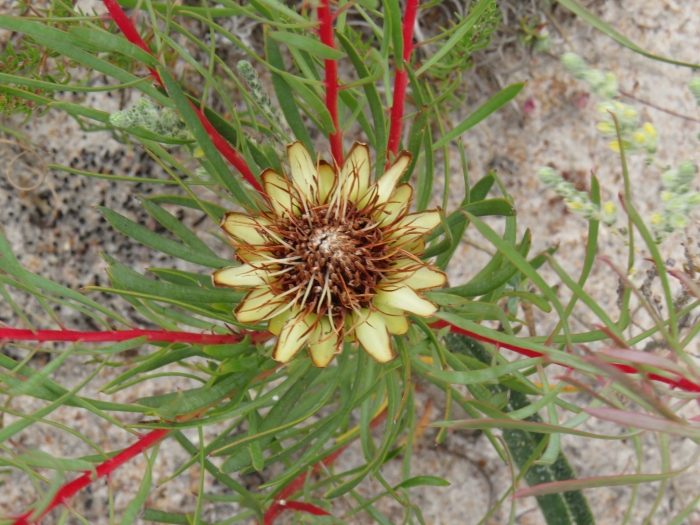Thistle Sugarbush
(Protea scolymocephala)
Thistle Sugarbush (Protea scolymocephala)
/
/

Jeremy Gilmore
CC BY 4.0
Image By:
Jeremy Gilmore
Recorded By:
Copyright:
CC BY 4.0
Copyright Notice:
Photo by: Jeremy Gilmore | License Type: CC BY 4.0 | License URL: http://creativecommons.org/licenses/by/4.0/ | Rights Holder: Jeremy Gilmore | Publisher: iNaturalist | Date Created: 2020-10-25T08:24:40-07:00 |
























































Estimated Native Range
Summary
Protea scolymocephala, commonly known as Thistle Sugarbush, is an evergreen shrub native to the fynbos region of Southwestern South Africa, where it thrives in nutrient-poor soils and is adapted to a Mediterranean climate with wet winters and dry summers. It typically grows to a height of 0.5 to 1.5 meters and features an erect growth habit. The inflorescence is yellowish-green and relatively small, measuring 3.5 to 4.5 cm in diameter. Thistle Sugarbush flowers in the South African spring, from June or July to November, peaking in early spring from August to September. The species is monoecious, with both male and female reproductive parts in each flower. The fruits are persistent, meaning they remain on the plant after drying, and the seeds within the fire-resistant, dried fruit are released after fires and dispersed by wind.
Thistle Sugarbush is valued for its unique, thistle-like blooms and its adaptability to dry conditions, making it suitable for xeriscaping and water-wise gardens. It is often used in rockeries, native plant gardens, and as a focal point in drought-tolerant landscapes. In cultivation, it requires full sun exposure, minimal water once established, and well-draining soils. While it is generally low-maintenance, it can be susceptible to root rot if overwatered or planted in poorly draining soils. Additionally, it may require protection from frost in colder climates.CC BY-SA 4.0
Thistle Sugarbush is valued for its unique, thistle-like blooms and its adaptability to dry conditions, making it suitable for xeriscaping and water-wise gardens. It is often used in rockeries, native plant gardens, and as a focal point in drought-tolerant landscapes. In cultivation, it requires full sun exposure, minimal water once established, and well-draining soils. While it is generally low-maintenance, it can be susceptible to root rot if overwatered or planted in poorly draining soils. Additionally, it may require protection from frost in colder climates.CC BY-SA 4.0
Plant Description
- Plant Type: Shrub
- Height: 1.5-4.5 feet
- Width: 1-3 feet
- Growth Rate: Rapid
- Flower Color: Brown, Cream, Green, Yellow
- Flowering Season: Winter, Spring
- Leaf Retention: Evergreen
Growth Requirements
- Sun: Full Sun
- Water: Low
- Drainage: Fast
Common Uses
Bee Garden, Bird Garden, Butterfly Garden, Fire Resistant, Hummingbird Garden, Low Maintenance, Showy Flowers
Natural Habitat
Fynbos region of Southwestern South Africa, adapted to a Mediterranean climate
Other Names
Common Names: Small Green Protea, Thistle Protea, Scoly
Scientific Names: , Protea scolymocephala, Protea scolymus, Erodendrum scolymiflorum, Leucadendron scolymocephalum, Protea angustifolia, Scolymocephalus scolymus,
GBIF Accepted Name: Protea scolymocephala (L.) Reichard